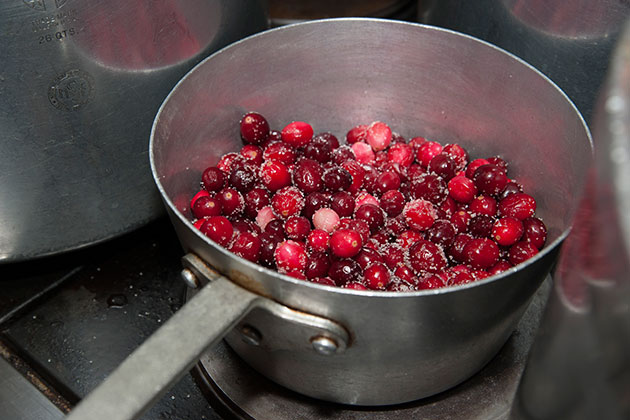While many will sit down to a traditional Thanksgiving dinner already thinking of second helpings of turkey and pumpkin pie, others may be concerned about calorie content, nutritional balance, and the time they are losing from their workout routines.
Slow down, keep it simple
Valerie Duffy, professor in the Department of Allied Health Sciences in the College of Agriculture and Natural Resources, says that when it comes to enjoying the bounty of a festive occasion, a healthier approach to dining lies somewhere in between these two extremes.
Duffy’s research takes her into the realm of food sensations, enjoyment, and satisfaction, the result of which is termed satiety – or that feeling of fullness and contentment we experience after eating. But, she says, it’s not just a matter of how much or how often we eat.
“Satiety is an extremely complex phenomena involving communication between the intestinal tract and the brain,” Duffy says. “On festive days such as Thanksgiving, the tendency to ‘gobble’ our food is what gets us into trouble from overeating.”
Her advice: Slow down and savor what we eat, and allow time for chemical signals to reach the brain to tell us when we are full.
“Too much variety in the meal, including appetizers, can also cause overeating,” she adds. “Keep it simple, and – like packing for a trip – cut down on the number of things packed onto dinner plates. Humans have a biological drive for sweets, so pay attention to the sensory cues you receive during the meal in order to save room for dessert.”
Ignore the distractions
Ronald Sabatelli, professor and head of the Department of Human Development and Family Studies in the College of Liberal Arts and Sciences and Dennis Pierce, director of Dining Services, agree that it’s important to slow down and enjoy the experience.
Sabatelli says that traditional celebrations such as Thanksgiving provide multiple benefits, as we gather with family and friends to enjoy a meal.
“Over time,” he says, “we have lost the habit of gathering as a family to enjoy an evening meal. Years ago, it was common to go to our grandparents’ house on a Sunday, where we would eat a meal with our relatives and the kids would get to play with their cousins. That doesn’t happen much anymore. So when it comes to a time like Thanksgiving, we have to create our traditions and rituals, we have to put aside the distractions of daily life, and we have to enjoy ourselves – and that includes enjoying mealtime.”
Enjoy!
Pierce adds that while it’s necessary to respect dietary restrictions and food preferences, holiday meals give us a chance to really enjoy what we’re eating. “On these special family days, we really need to let go and indulge ourselves as much as we can,” he says. “We need to enjoy what we’re eating and who we’re eating it with.
One thing that sometimes makes Thanksgiving and other holiday meals seem like a chore is the high level of expectation people bring to the table. Pierce says meal preparation doesn’t have to be complicated to be enjoyable, and he cites popular cooking trends such as soaking a turkey in brine before cooking – he says it’s a foolproof way to seal in taste while assuring the meat will be moist – and the current popularity of kale as a versatile and tasty vegetable.
And speaking of vegetables, Pierce points out that one of the advantages of a traditional Thanksgiving dinner is that there is generally an ample supply of vegetables to choose from – with everything from potatoes to squash to green beans gracing the table – and those who are on vegetarian or vegan diets can be seamlessly accommodated with just a little advance planning. Since vegetables are generally lower in calories but high in volume and nutrients, they can make us feel full while still ‘eating healthy.’
Duffy’s research suggests that cooking techniques that block the bitterness and enhance the sweetness of kale will ensure holiday guests will be back for second helpings.
So the experts agree: It doesn’t matter whether you sit down to turkey or tofu as a main course, the experience of preparing and eating a holiday meal with family and friends should be an enjoyable one. From soup to nuts.





